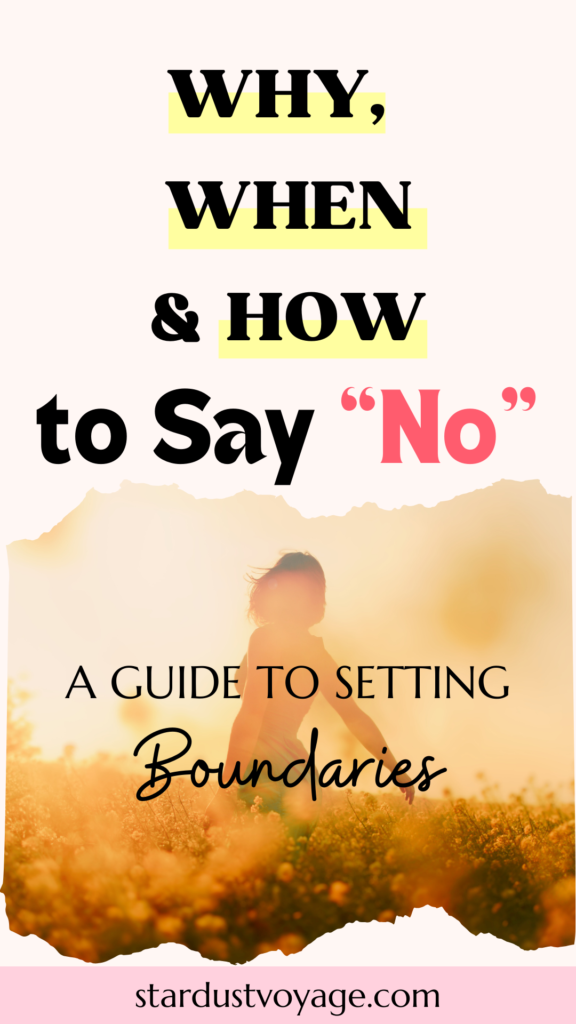Setting boundaries can feel daunting, but it’s one of the most empowering things we can do for ourselves. In a world that often glorifies busyness and constant availability, saying “no” can be a radical act of self-care. It’s not just about declining requests or invitations; it’s about honoring your own needs, energy, and time.
When we learn to say no, we reclaim our power and create space for what truly matters. Whether it’s a friend asking for a favor that stretches us too thin, a work obligation that eats into our time, or even an event that just doesn’t resonate, the ability to set boundaries is crucial for maintaining our well-being.
In this guide, we’ll explore the “why,” “when,” and “how” of saying no. You’ll discover the importance of understanding your limits, recognizing the right moments to decline, and employing strategies to communicate your boundaries effectively. This journey is about nurturing your inner strength and prioritizing your peace. So, let’s dive into the transformative power of saying no and embracing a more balanced and fulfilling life.

Why Say No
Preserving Personal Boundaries
Personal boundaries are the invisible lines that define where your responsibilities end and where others’ demands begin. They are essential for maintaining your mental and emotional health. Imagine boundaries as a protective barrier that prevents you from becoming overwhelmed by external pressures. When you say no, you’re reinforcing these boundaries, safeguarding your time and energy from being depleted by additional commitments. This act of self-preservation allows you to focus on your priorities and invest your resources in what truly matters to you, whether it’s personal projects, relationships, or self-care.
Setting boundaries is not merely about refusing requests; it’s about making conscious choices that reflect your values and well-being. It’s about understanding your limits and respecting them, which in turn enables you to engage more fully and meaningfully with the aspects of your life that align with your goals and passions.
Enhancing Self-Respect
Saying no is also an important act of self-respect. It’s a way of honoring your own needs and priorities. Each time you assert your boundaries, you communicate to yourself and others that your time and energy are valuable. This builds self-confidence and reinforces your sense of self-worth. It’s easy to fall into the trap of trying to please everyone, but when you consistently say yes to demands that don’t serve you, you risk feeling depleted and resentful.
By practicing self-respect through the act of saying no, you prevent burnout and maintain a healthier balance in your life. It’s about prioritizing your own needs and making choices that align with your values and aspirations. This process helps you cultivate a positive self-image and a greater sense of personal integrity.
Fostering Healthy Relationships
Ironically, saying no can enhance your relationships rather than damage them. When you communicate your boundaries clearly and respectfully, you set a standard for mutual respect. This not only helps to prevent misunderstandings but also encourages more honest and open communication. People who respect your boundaries are more likely to reciprocate, creating a healthier and more supportive dynamic.
Establishing clear boundaries helps to avoid the accumulation of resentment and frustration that can arise from over-commitment. It allows for more genuine interactions where both parties understand and appreciate each other’s limits. By setting boundaries, you contribute to a more balanced and respectful relationship dynamic.
When to Say No
Identifying Over-commitment
One of the most common reasons for saying no is over-commitment. It’s crucial to be aware of the signs that you’re taking on too much. Symptoms of overcommitment can include chronic fatigue, irritability, and a constant sense of being overwhelmed. When you’re stretched too thin, your effectiveness diminishes, and your stress levels rise.
To avoid this, regularly assess your current obligations and evaluate whether you can handle additional responsibilities. It’s important to be honest with yourself about your capacity and prioritize tasks that align with your goals. Recognizing these signs early allows you to take proactive steps to manage your workload and protect your well-being.
Recognizing Misalignment
Another key moment to say no is when a request or opportunity doesn’t align with your values or goals. Misalignment can lead to dissatisfaction and a sense of unfulfillment. Before agreeing to new commitments, consider whether they fit with what you truly care about and aspire to achieve.
Evaluate the opportunity cost of taking on additional tasks. Will it distract you from your primary objectives or values? Making decisions based on alignment with your long-term goals helps you stay focused on what matters most and ensures that your efforts are directed toward meaningful pursuits.
Assessing Emotional Readiness
Emotional readiness plays a significant role in knowing when to say no. If you’re feeling overwhelmed, reluctant, or conflicted, it’s important to assess whether these feelings stem from genuine concerns or a sense of obligation. Acknowledging your emotional state helps you make more informed decisions about setting boundaries.
Understanding your limits and recognizing when you’re not ready to take on more is crucial for maintaining your well-being. Reflect on your feelings and consider whether a request aligns with your current emotional and mental state. By being aware of your limits, you can make decisions that support your overall health and happiness.

Pin This Now!
How to Say No
Choose the Right Moment
The way you say no can greatly impact how your refusal is received. Timing is essential for delivering a response that is respectful and considerate. Aim for a moment when you can have a private and thoughtful conversation. This approach ensures that the discussion remains focused and free from external pressures.
Avoid saying no in a rushed or public setting, as this can lead to misunderstandings or additional stress. By choosing the right time and place, you show respect for both yourself and the other person, setting the stage for a more constructive and empathetic dialogue.
Be Direct and Honest
When delivering a refusal, clarity is key. Use straightforward language to communicate your decision without leaving room for misinterpretation. Avoid excessive explanations or justifications, as these can lead to unnecessary guilt or confusion.
Being direct and honest helps ensure that your message is understood and respected. It also prevents the conversation from becoming more complicated than it needs to be. Simply state your decision and provide a brief explanation if necessary, focusing on your needs and boundaries.
Offer Alternatives
If appropriate, offer alternatives to help address the request without compromising your boundaries. Suggesting other resources, individuals, or potential future opportunities can show that you’re still willing to be supportive, just not in the current situation.
Offering alternatives helps maintain a positive and collaborative tone, demonstrating that you value the other person’s needs while still honoring your limits. This approach fosters goodwill and keeps the interaction constructive, even when you have to decline a request.
Practice Assertiveness
Assertiveness is essential for effectively saying no. Maintain a calm and composed demeanor while expressing your decision. Use “I” statements to articulate your feelings and boundaries without sounding confrontational.
For example, you might say, “I appreciate the offer, but I’m currently focusing on other priorities and won’t be able to take this on.” Practicing assertiveness helps you navigate difficult conversations with confidence and clarity, ensuring that your refusal is communicated with respect and poise.
Conclusion: The Freedom and Empowerment of Setting Boundaries
Mastering the art of saying no is a transformative practice that can significantly enhance your quality of life. By understanding why it’s important to set boundaries, recognizing the right moments to say no, and learning how to communicate your refusal effectively, you can create a more balanced and fulfilling existence. Embracing the power of refusal allows you to protect your time, honor your values, and foster healthier relationships. Remember, saying no is not about rejecting others; it’s about affirming your own needs and creating space for what truly matters. By practicing the art of saying no, you pave the way for a more serene and empowered life.







